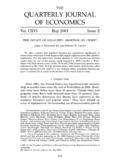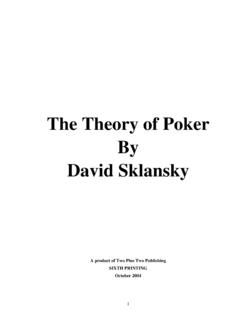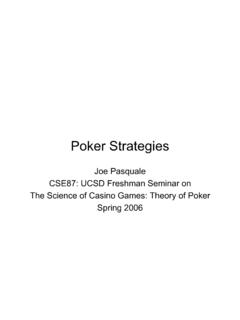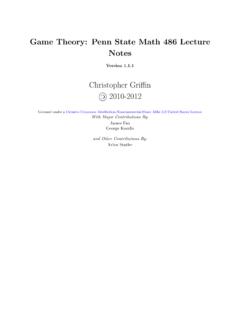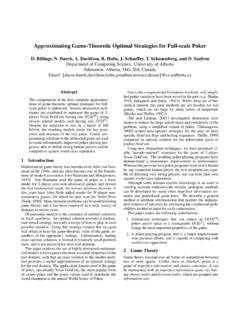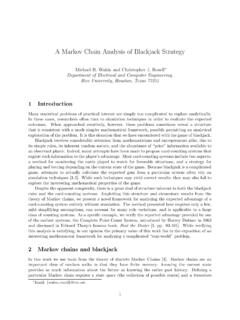Transcription of The Role of Skill versus Luck in Poker: Steven D. Levitt ...
1 The Role of Skill versus luck in Poker: Evidence from the World Series of Poker1 Steven D. Levitt and Thomas J. Miles April 2011 1 We would like to thank Carter Mundell for truly outstanding research assistance. Author addresses: Levitt , Department of Economics, University of Chicago, 1126 East 59th Street, Chicago, IL 60637, Miles: University of Chicago Law School, 1111 East 60th Street, Chicago, IL 60637, Abstract In determining the legality of online poker a multibillion dollar industry -- courts have relied heavily on the issue of whether or not poker is a game of Skill . Using newly available data, we analyze that question by examining the performance in the 2010 World Series of Poker of a group of poker players identified as being highly skilled prior to the start of the events.
2 Those players identified a priori as being highly skilled achieved an average return on investment of over 30 percent, compared to a -15 percent for all other players. This large gap in returns is strong evidence in support of the idea that poker is a game of Skill . Until recently, millions of American consumers played poker online, spending an estimated $6 billion a year on the activity, despite the obstacles to playing posed by the 2006 passage of the Unlawful Internet Gambling Enforcement Act (UIGEA). While the UIGEA does not make it illegal for individuals to play online poker for real money, it is illegal for banks and other financial institutions in the to process transactions with online gambling sites. Federal authorities recently indicted executives of the three leading online poker sites that allow Americans to In response, these poker sites stopped accepting American players, but vowed to demonstrate the legality of online poker.
3 While many arguments can be made for and against UIGEA, the single most important factor in determining the legality of poker is whether poker is a game of Skill or a game of luck . The UIGEA defines unlawful internet gambling as transmitting through the internet a wager that is illegal under state or federal law. Under state law, courts have evaluated the legality of a game by asking whether it is dominated by Skill or luck . The federal statute s own definition of gambling or wagers (risking something of value upon a game of chance with an agreement that certain values will be given for particular outcomes of the game) is itself borrowed from state definitions of gambling. This definition makes the legality of poker under federal law also depend on a Skill - versus - luck inquiry. Whether the UIGEA governs online poker therefore hinges on whether poker is a game of Skill or chance.
4 The UIGEA remains controversial. Immediately upon its passage, calls began for the repeal of the UIGEA. In fact, a bill to legalize and regulate online poker, 2267, was passed by the House Financial Services Committee in July of 2010. With the arrival of a new Congress in 2011, the legislation was reintroduced in the committee, 1174, and it is currently awaiting action. 2 Matt Richtel, Cracks down on Online Gambling, New York Times, April 15, 2011, at B1. Despite the central role that the Skill versus luck dichotomy has played in legal rulings with respect to poker, there is little academic research on the subject. State courts that have ruled on whether poker is a game of Skill - versus - luck generally have done so in the absence of any statistical evidence, and often they have treated all types of poker games A highly popular poker game online is Texas Hold Em, and the few cases that consider its permissibility have generated sharp dissents on whether Skill dominates luck in the A small literature has emerged that attempts to test the importance of Skill in poker.
5 Cabot and Hannum (2005) conduct computer simulations of repeated rounds of Texas Hold Em and seven-card stud with players following skilled or unskilled strategies. In their simulations, skilled players earned as much as 10 times that of the unskilled. Dedonno and Detterman (2008) conducted experiments in which participants played hundreds of hands of Texas Hold Em poker, and some participants received instruction on poker strategy while others did not. They found that participants receiving instruction outperformed the contol group. These studies reinforce a point which should be clear from introspection: there are ways to play quite poorly in poker which ensure that the individual loses money ( , folding every hand). Less obvious based purely on introspection is whether, among the set of individuals actually engaged in playing poker for high stakes, there is a large role for Skill .
6 Especially relevant to this question is the recent work of Croson et al. (2008) which analyzes finish positions of individual players across 81 high-stakes poker tournaments, conditional on a player making the money in that tournament, finishing roughly in the top ten percent of all entrants. The idea underlying the 3 Early state court decisions contained strong pronouncements about poker and have proven highly influential on subsequent courts. City of Shreveport v. Bowen, 40 So. 859 (La. 1906) ( [I]t is a matter of common knowledge concerning which there can be no doubt or dispute that draw poker is a gambling game, pure and simple ); Ginsberg v. Centennial Turf Club, 251 926 (Colo. 1952) ( No one would contend that a game of poker, in which money is bet on the relative value of cards dealt by participants, constitutes a lottery, but it is most certainly gambling ).
7 4 People v. Mitchell, 444 1153 ( 1983); Garrett v. State, 963 700 ( 2007). paper is that positive serial correlation in outcomes across tournaments is an indicator of Skill . In those cases where a player makes the money, both having finished in the top 18 of a previous tournament and the number of top-18 finishes in previous tournaments are found to be significantly and negatively correlated with a player s rank among the top-18 finishers in the current tournament. Also, a player s average previous rank in the top 18 is significantly and positively correlated with their rank in the current tournament. The greatest shortcoming of the Croson et al. (2008) analysis unavoidable because of the data available -- is that all the analysis conditions on a player making the money in a particular tournament because information on the full set of players who enter a tournament is not available.
8 Also absent are any data regarding the number of chips that a player has amassed at intermediate points along the way in a tournament. These data limitations introduce three potential weaknesses. First, because these tournaments generally have many entrants, any given player only rarely is one of the top eighteen finishers, leading the useable information set to be quite sparse. More than two thirds of the players they observe appear in their data exactly once, and thus provide no useful identifying variation. 5 Among the players who do appear on multiple occasions, roughly half appear exactly twice. A second potential problem in the Croson et al. (2008) analysis is that the inference hinges on the assumption that, absent Skill , the finish positions conditional on making the money would be randomly distributed across players.
9 This assumption is likely to be violated if players follow different tournament strategies. The psychic benefits that players derive from just making the money are likely to differ substantially. For instance, amateur players who enter only a few tournaments are likely to value the bragging rights of lasting long enough to make the 5 Because their measure of Skill is the correlation in outcomes across tournaments, at least two observations per player are required. money more than top professionals, who recognize that the highly convex distribution of payouts mean that winning an occasional tournament is far more important to long term profits than a steady diet of finishes in the lower half of the top eighteen. Players who are focused on winning are likely to pursue a riskier strategy that, all else equal, leads them to be eliminated earlier in the tournament in return for having a greater number of chips down the stretch on those occasions when they survive to the end.
10 Because the Croson et al. (2008) analysis is done conditional on finishing in the top eighteen, holding Skill constant, players following riskier strategies will appear to perform better even if their strategy has the same unconditional expected value, leading to a spurious upward bias in their estimate of Skill . Finally, since the Croson et al. (2008) data do not include information on who enters tournaments, they are unable to estimate the return on investment (ROI) across ROIs provide a more direct and intuitive metric for quantifying Skill than correlations. In this paper, we take advantage of newly available information from the 2010 World Series of Poker (WSOP) to improve on the methodology of Croson et al. (2008).7 For the first time, complete lists of all players who entered each of the 57 tournaments that comprise the WSOP were made available in 2010.
